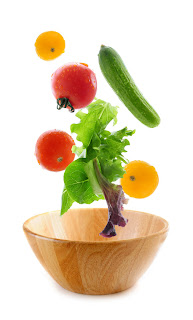Vitamin A- Is a fat soluble vitamin Promotes healthy eyes, skin, hair, teeth, gums, cancer prevention, healing of infections. Natural sources of vitamin A include; Raw carrots, pumpkins, yams, tuna, cantaloupe, mangoes, turnip, beet greens, butternut squash, spinach, fish, and eggs.
Vitamin E- Is a fat soluble vitamin and can keep you looking younger by retarding cellular aging due to oxidation. Helps to prevent and dissolve blood clots, alleviate fatigue, decrease risk and progression of Alzheimer’s disease. Natural sources include; vegetable and nut oils, including: Soybean, corn and safflower; Spinach, whole grains, wheat germ, sunflower seeds.
Vitamin C- (ascorbic acid) is water soluble and a potent antioxidant plays a primary role in the formation of collagen, which is important for the growth and repair of body-tissue cells, gums, blood vessels, bones, and teeth. Natural sources include; Broccoli, cantaloupe, kiwi, oranges, pineapple, peppers, pink grapefruit, strawberries, asparagus, avocados, collards, dandelion greens, kale, lemons, mangos, onions, radishes, watercress.
The B-complex vitamins-are all water soluble
B1 (thiamine); promotes growth, aids digestion, especially of carbohydrates, improves mental attitude, keeps nervous system, muscles, and heart functioning normally. Some natural sources include; brewers yeast, rice husks, whole wheat, soybeans, egg yolks, fish, oatmeal, peanuts, and most vegetables.
B2 (riboflavin); Aids in growth and reproduction. It promotes healthy skin, nails, and hair. Benefit vision, alleviate eye fatigue. Function with other substances to metabolize carbohydrates, fats and proteins. Help alleviate the pain of migraine headaches. Natural sources: Milk, liver, kidney, cheese, leafy green vegetables, fish, eggs, yogurt, beans.
B3 (niacin); Necessary for healthy nervous system and brain functions. Helps reduce cholesterol and triglycerides increase circulation and reduce high blood pressure. Also aids in metabolizing fats and promoting a healthy digestive system. Natural sources include: Fish, lean meat, whole wheat products, brewer’s yeast, liver, wheat germ, eggs, avocados, dates, figs, prunes
B5 (pantothenic acid); involved in energy production; controls fat metabolism, is essential for brain and nerves. Helps make antistress hormones (steroids). It also maintains healthy skin and hair. Natural sources; Mushrooms, watercress, broccoli, alfalfa sprouts, peas, lentils, tomatoes, cabbage, celery, strawberries, eggs, squash, avocados, whole wheat.
B6 (pyridoxine); Essential for protein digestion and utilization, brain function, and hormone production. Helps balance sex hormones, that’s why it’s used for PMS and menopause. Natural sources; Watercress, cauliflower, cabbage, peppers, bananas. Squash, broccoli, asparagus, lentils, brussel sprouts, onions. Some nuts and seeds.
B12 (cyanocobalamin); Needed for making use of protein. Helps the blood carry oxygen, it is essential for energy. Needed for synthesis of DNA. Essential for nerves. Deals with tobacco smoke and other toxins, can relive irritability; improve concentration, memory and balance. Natural sources: Oysters, sardines, tuna, eggs, shrimp, cottage cheese, turkey and chicken.
Biotin- Also known as coenzyme R or vitamin H; Helps the body use essential fats, assisting in promoting healthy skin, hair (aids in keeping hair from turning gray and preventive treatment for baldness) and nerves. It is usually included in most B complex supplements and multiple vitamin tablets. Natural sources: Egg yolk, Soy flour, brewers yeast, peanut butter.
Calcium-can maintain strong bones and healthy teeth, decrease the risk of bone loss and fractures, helps lower the risk of colon cancer, keeps your heart beating regularly, helps metabolize your body’s iron, aids your nervous system and helps in weight management natural sources; Soybeans, tofu, sardines, salmon, peanuts, walnuts, sunflower seeds, broccoli, kale and dried beans
Magnesium-Is necessary for vitamin C metabolization, phosphorus, sodium and potassium. It helps burn fat and produce energy, keeps cholesterol levels under control, helps prevent calcium deposits and kidney and gall stones, can also alleviate premenstrual syndrome (PMS).Natural sources; figs, unmilled grains, almonds, seeds, dark green veggies and bananas.
Iron- Is required for life, it’s necessary for the productions of hemoglobin, myoglobin, and some enzymes. Iron is also necessary for proper absorption for B vitamins. Natural sources: clams, dried peaches, farina, egg yolks, nuts, beans, asparagus, oatmeal and molasses.
Zinc-is essential for protein synthesis and collagen formation, it also governs the contractibility of muscles, there is also strong evidence that it’s required for the synthesis of DNA (deoxyribonucleic acid) Natural sources; seafood(oysters), wheat germ, brewers yeast, pumpkin seeds, eggs, ground mustard.
Manganese- Is needed for normal bone structure, necessary for the proper digestion of food, important for the formulation of thyroxin, which is the principal hormone for the thyroid gland Natural sources; nuts, green leafy vegetables, whole grain cereals, peas and beets.
Chromium-Works with insulin in the metabolization of sugar; helps bring protein to where it’s needed. It can help prevent and lower high blood pressure; helps prevent cravings and sudden drops in sugar. Natural sources; wheat germ, clams, brewers yeast, oil, chicken and corn
Selenium- Is an antioxidant; it is needed for the production of glutathione peroxidase, which is the body’s primary antioxidant that is found in every cell. Selenium helps protect against various types of cancer and aids in reducing the risk of heart disease and stroke, can also help as a treatment and prevention of dandruff, Natural sources; seafood, broccoli, garlic, brown rice, tuna fish, onions, wheat germ and tomatoes.
